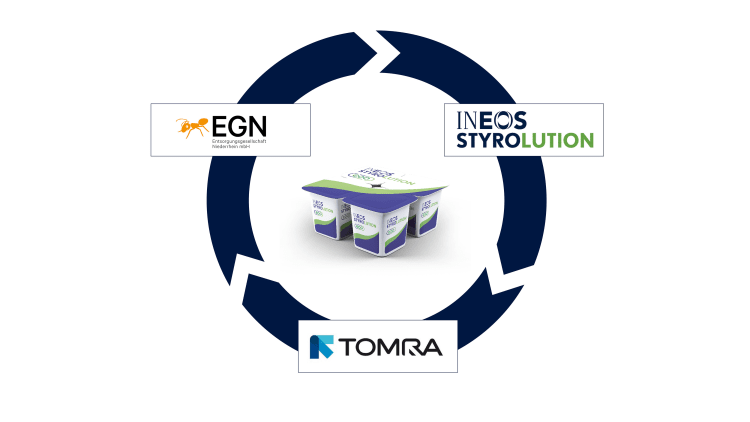
Tomra, the world leader in waste transformation; Ineos Styrolution, the global leader in styrenics; and Egn Entsorgungsgesellschaft Niederrhein, a leading recycling company, have today announced a ground-breaking project to convert post-consumer polystyrene (PS) waste into recycled polystyrene for food packaging applications.
Egn, a subsidiary of the Swk AG, will build a green field state-of-the-art advanced mechanical recycling facility processing with a capacity to process 40kt of post-consumer polystyrene (PS) waste per year. It is expected to be the first large-scale facility of its kind. Egn will manage sorting and washing, while Ineos Styrolution will be responsible for the “super-cleaning” purification process to comply with the European Food Safety Authority (EFSA) requirements for food contact applications.
The new facility will be located in Krefeld, Germany. It is expected to start up in mid-2025, allowing Ineos Styrolution to start serving customers at commercial scale.
An agreement with Tomra to provide sorting technology and feedstock complete the project. Tomra Feedstock will collect post-consumer polystyrene waste from disposed food packaging and deliver it to the new site in Krefeld, Germany.
Pierre Vincent, Managing Director Egn says: “We share Ineos Styrolution’s vision of closing the loop for food-contact quality polystyrene. I expect the dairy industry to especially benefit from this new offering by allowing them to mechanically recycle from yoghurt pot to yoghurt pot creating a true circular economy for this material.”
Jürgen Priesters, Senior Vice President Tomra Feedstock, comments: “We are proud to contribute to this first commercial-scale polystyrene mechanical recycling facility for food contact applications. Polystyrene has the right composition to be recycled mechanically for food applications. The mission of Tomra Feedstock is to keep PS in a true circularity.”
Steve Harrington, CEO, Ineos Styrolution adds: “This is an exciting step forward for our industry. Our three companies bring complementary expertise to this project, and because of this unique collaboration, we will be able to provide customers with high-performing circular polystyrene produced at a significantly lower carbon footprint. Already, we are seeing high interest from customers and brand owners to secure long-term contracts.”

Key facts about recycling of polystyrene
The advanced mechanical recycling process benefits from the inherent properties of polystyrene making it the material of choice for real circularity.PS is proven to be one of the best sortable plastics in the waste stream and is one of only two polymers that can achieve food-contact qualities with mechanical recycling.
The material offers infinite recyclability, retaining its property profile after many mechanical recycling cycles at virgin quality levels. Due to its properties, PS takes up fewer contaminants in the waste stream.
It is expected that a significant percentage of recycled food packaging material will be realized in a very short timeframe. Investment in commercial scaling of PS recycling will lead to a growing market share and a reduction in packaging taxes and licensing fees in countries where such frameworks are in place.


